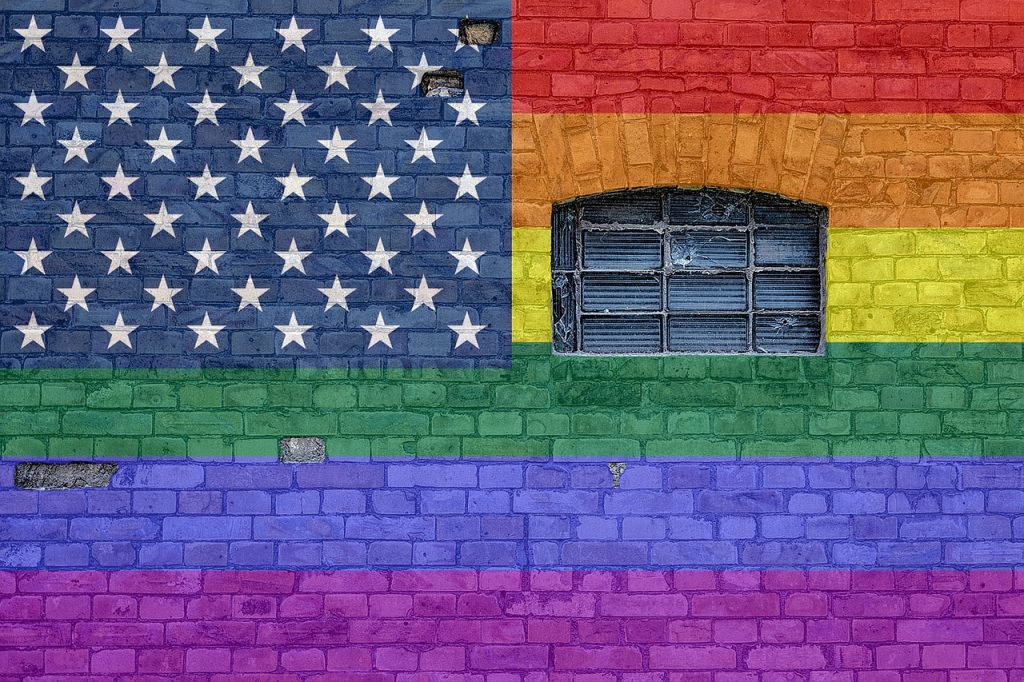GLAAD, a leading gay advocacy outfit, released a new report showing that positive attitudes toward homosexuality and people who identify as LGBT have decreased a bit over the last few years. They sum up their findings rather starkly: “This year’s survey reflects a decline with people’s comfort year-over-year in every LGBTQ situation…”
The organization shows great concern over what they describe as the “significant decline in overall comfort and acceptance of LGBTQ people.” Their survey results indicate, at least, that indifference toward the LGBT community and its political efforts is increasing. At most, support for gay causes is diminishing. The report’s introduction, written by GLAAD’s President Sarah Kate Ellis, interprets the findings with dramatic, fearful flair. “This year,” she writes, “the acceptance pendulum abruptly stopped and swung in the opposite direction.”
The truth is not as dramatic as GLAAD makes it out to be. The changes they track in attitudes do indicate a less passionate embrace of alternative sexual behaviors and gender identities this year than in years past, but not markedly so. Most advocacy groups would not be terribly concerned about such a shift. But to GLAAD, even indifference—much less disapproval—is a cause for great concern. If celebration and affirmation of LGBT causes are not increasing, bigotry must be on the rise. There is no middle ground.
What is GLAAD’s explanation for this shift away from gay affirmation? It’s not difficult to guess. It’s President Trump and the supposedly increasing atmosphere of “intolerance” he has brought to our nation. Really?
Let’s think about this for a moment. If Trump and his supporters actually think gay and lesbian people don’t belong in polite society, wouldn’t those who supported GLAAD’s positions in years past double down on their pro-LGBT positions in reaction? Did President Trump actually convince these one-time supporters that their backing of gay causes was wrong? This doesn’t seem likely. Something else must be at work here.
Start your day with Public Discourse
Sign up and get our daily essays sent straight to your inbox.Could it be the LGBT community’s post-Obergefell actions and attitudes have not rested well with mainstream America?
A Radicalization of Ideology and Rhetoric
This is not an outlandish hypothesis. Even some major leaders in the LGBT community have suggested it. Andrew Sullivan, writing about the GLAAD report in New York magazine, warns that no one “seems to notice the profound shift in the tone and substance of advocacy for gay equality in recent years, and the radicalization of the movement’s ideology and rhetoric.” This aggressive radicalization “is surely having an impact,” he holds. How could it not, Sullivan asks, when his movement’s public rhetoric shifted from “live and let live” to the thunderously demonizing “agree with us in every regard or be a bigot”?
If you don’t believe that Caitlyn Jenner is a woman, you’re the worst kind of hateful. If you think a child deserves a mother and a father, you are a bigot. If you think a gender-dysphoric boy should not be treated as a girl, you’re evil. If you think a man should use the men’s restroom, regardless of what sex he thinks he is, you are discriminatory. If you think parents’ desire to get their children counseling help for their same-sex attraction is okay, you’re very dangerous. If your church teaches that homosexual sexual activity is wrong, your church is bigoted. You must agree with every part of LGBT values or be slimed. This dictatorial absolutism is not sitting well with many Americans.
The crown jewel of the gay movement’s efforts—the Supreme Court’s degendering of marriage—was sold to the heterosexual world on the question, “How does someone else’s gay marriage affect me?” Most people unquestioningly accepted that it wouldn’t.
But they are learning through real-life events that gay marriage does indeed affect them—or, at least, people very much like them. A great many Americans figured they don’t have to like gay marriage, but why should they stand in the way of Jim and Frank across the street marrying? You live your life, they reasoned, and I’ll live mine. But the equation has turned out to be much more complicated. Jim and Frank needed “marriage equality” to feel like full citizens, we were told. Who doesn’t want Jim and Frank to feel like full citizens? I do. But now they are learning that “marriage equality” is not enough. They must also agree to any and all demands from the LGBT powers, regardless of their personal religious or moral beliefs—or be branded with a Scarlet B.
Sullivan and others in his community are merely noting what many of us in the effort to prevent the degendering of marriage predicted would happen. From surprisingly fast and unexpected victory can come great hubris and the desire to utterly crush one’s opponents. Such overreach, in turn, provokes a backlash from those who once supported the victor’s cause.
Whom Will It Hurt?
Americans are hearing the troubling stories of good people just like them who harbor no ill will toward same-sex-attracted individuals. These people, particularly small business owners, are being mercilessly pulverized because they cannot in good faith participate in certain events. I’m sure you’ve heard their stories, but I’ll summarize just a few here.
Consider Melissa Klein and her husband, who operated SweetCakes by Melissa. She was required by the state of Oregon to pay a lesbian couple $135,000 for causing them “emotional and mental suffering,” according to the state. She could not create a cake for their gay wedding, because such weddings are proscribed by her Christian faith. As a result, they have had to close their store and have been tied up in legal trouble as they appeal the ruling.
Americans have also heard the story of Barronelle Stutzman, a grandmotherly florist. She was taken to court by the Washington state’s attorney general when she explained to a gay couple that she could not make flower arrangements for their wedding. The couple knew that Stutzman did not harbor ill feelings toward gay people, as they had been welcome customers and friends for more than nine years. She happily sold them flowers for other special occasions. Stutzman explained, “If I did Rob’s wedding, it would be from my heart, because I think he’s a really special person.” But she could not put her heart into them because of her convictions. The state said her decision was discrimination and sued both her business and her personally. We have witnessed the full power of the state coming down on her.
Americans have similarly read about Blaine Adamson, a Kentucky businessman who owns a promotional printing company that happily serves gay customers and has gay employees. He was sued for explaining that he could not, in good conscience, print t-shirts for a local gay pride parade. He could not support such an event with his handiwork. It was of no consequence that he also refused to print a simple black tee with white writing that said, “Homosexuality Is a Sin.” He didn’t think this proclamation reflected Christian love. But refusing to do a shirt for a local pride event led to his being targeted by a local “human rights commission” as an intolerable bigot. He has been tied up in court for years.
People have heard the story of Yvette Cormier, who complained when a man believing he’s a woman walked into the woman’s dressing room at a Michigan Planet Fitness and started to undress. Cormier became very uncomfortable, explaining, “I was stunned and shocked. He looked like a man… He did not look like a woman,” adding, “It was very scary.” Surely this could be cleared up by talking to management, she thought. So she did. They told her she was in the wrong, that she was being intolerant, and that the man had every right to be in the women’s changing room, since he claimed to be a woman. People saw this as utter madness, just as they did when Target adopted the same policy. Even so, Planet Fitness rescinded Cormier’s membership because she warned other female members to watch out for men coming into their locker room. The state of Michigan sided with the gym, and Cormier’s reputation as a kind person was destroyed.
The nation knows the story of the Denver cake baker, Jack Phillips, who has taken his case all the way to Supreme Court. In 2012, he kindly told a gay couple wanting a custom wedding cake that he could not make it for them because of his faith. He serves gay customers all the time and does so happily. He just can’t make same-sex wedding cakes, because he believes his artistry would be supporting something that he cannot in good conscience endorse. For the same reason, he refuses to do Halloween and adult-themed cakes. The punitive Colorado Civil Rights Commission said unless he made cakes for same-sex weddings, he must stop making cakes for everyone. Wedding cakes make up about 40 percent of his shop’s business. He and his staff were ordered to go through sensitivity training and to file quarterly reports with the state every time he refused to design any cake, explaining why. He has received many death threats. Remarkably, he explained that these intimidations “give me the opportunity to pray for people I wouldn’t otherwise know.” Americans saw him explain his story on The View and witnessed for themselves that he was not the bigoted Neanderthal he has been made out to be. They have gotten to see Jack Phillips for what he is: a very kind, gentle individual whom they can relate to.
Clearly, other people’s same-sex weddings are affecting very good people in very damaging ways.
Justice and Tolerance
The average American who was asked to back same-sex marriage on the principle of justice and tolerance is seeing that those who requested their support are not living by their own rules. They are finding that “marriage equality” is not enough. They are finding the deal has been unilaterally renegotiated: “You will not only support our right to marry, but you will also support our marriages in every way that we ask. If you do not, we will take you to court, ruin your business, take your money, slime your good name, and even threaten your life.” The remarkable examples of these injustices are surprising and alarming many good citizens.
When winners overplay their hand, demanding everything from their opponents by threat of devastating penalty, those who cheered their victory tend to be turned off by their abuse of power.
Leave Trump out of it. This is why GLAAD found that attitudes toward the LGBT community are cooling. It’s not really that hard to miss. Perhaps GLAAD and its allies should learn to practice what they preach: tolerance of other people’s beliefs and practices, even if they don’t fully understand them.













